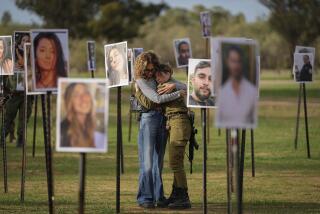Trinidad Rebels Free Premier; 40 Still Hostages
- Share via
PORT OF SPAIN, Trinidad — Captive Prime Minister A. N. R. Robinson, suffering a festering leg wound and imperiled eyesight, was released by black Muslim rebels Tuesday, but 40 other hostages were still being held as efforts to free them dragged into a fifth day without progress.
The ailing prime minister was led to an ambulance in front of Red House, the twin-island nation’s besieged Parliament building, by one of his captors and another hostage, according to Atty. Gen. Anthony Smart, a senior member of the Cabinet team that has been negotiating with the rebels via radio, telephone and a clergyman intermediary.
Robinson was taken first to the Trinidadian army’s Camp Ogden, then to an unidentified hospital, Smart said.
He said Robinson “is in good spirits,” but he is reported to be suffering from an apparently infected gunshot wound in one leg. Robinson also reportedly is experiencing eye problems resulting from his lack of glaucoma medication since the Parliament building was seized by the rebels in a coup attempt Friday evening.
Smart refused to give details of the talks that led to Robinson’s freedom, but he indicated that the release did not represent a breakthrough in the overall hostage negotiations, which ran aground after near-agreement Monday. A government spokesman, Gregory Shaw, said the hostage takers’ “demands are escalating, and some of the demands are clearly impossible to meet.”
“This crisis is far from over,” Smart declared.
The first hint of the surprise development Tuesday came in an early morning telephone conversation between the leader of the rebels and journalists. Speaking from the besieged Trinidad and Tobago Television (TTT) building, the chief hostage taker, Yasin abu Bakr, offered to release Robinson on humanitarian grounds, with no strings attached, “because he is sick.”
Meanwhile, Abu Bakr virtually bombarded local and foreign reporters with phone calls to the government’s temporary press headquarters in the Holiday Inn Hotel, a few blocks from Red House. The calls revealed a growing tone of desperation among his estimated 120 armed comrades and at least some captives.
Among other things, Abu Bakr charged that a coterie of Cabinet ministers had torpedoed a signed agreement to end the crisis, which he contended was reached Saturday.
“They have now pulled a new coup, and they are holding everyone ransom,” Abu Bakr cried in an anxious, angry voice during one call several hours before Robinson’s release. “They are blocking it because they want Mr. Robinson dead.”
The agreement was not spelled out by Abu Bakr or government officials, but it reportedly included Robinson’s pledge to resign; formation of an interim government including Abu Bakr, and total amnesty for the rebels, who are believed to have received military training and financial support from Libya.
The 48-year-old former police officer, who founded the black Muslim group Jamaat al Muslimeen six years ago, called for former U.S. President Jimmy Carter and the Rev. Jesse Jackson to come to Trinidad so he would have someone “straightforward” to talk to.
In another call to journalists, Abu Bakr complained that the police and army troops who have surrounded the two hostage sites are trying to starve his group into submission. He charged that the army ignored his calls for food and water until 3 a.m. Sunday, when they placed provisions in the street in front of the television building and dared the hostage takers to come out for them.
The Trinidad and Tobago Defense Force also had tried to split the hostage takers by cutting off all lines of communication between the television buildings, where 25 of the captives are held, and Red House, where 15 remain at gunpoint, Abu Bakr contended.
The Defense Forces spokesman, Maj. Dave Williams, acknowledged that all lines to the two buildings have been cut and expressed astonishment that the rebel leader had secured a phone line to the press hotel. Abu Bakr explained that he had “a genius” in his group who engineered the calls.
Two of the hostages, television news director Jones P. Madeira and reporter Raul Pantin, seconded Abu Bakr’s agitated complaints when he passed the telephone to them.
“When I spoke to the army yesterday afternoon, I said, ‘Everybody’s dying of starvation in here,’ ” Madeira recalled Tuesday. “What are they trying to do, get me killed?”
“Our lives are threatened here, but not by the imam,” said Pantin, using Abu Bakr’s title as an Islamic religious leader.
When a reporter asked Abu Bakr if he is fearful of the outcome of the siege, he replied only: “Everyone will die at some time in their lives.”
Meanwhile, U.S. Ambassador Charles A. Gargano provided some insight into the situation for five American journalists who visited the American Embassy on Tuesday.
Describing his own contacts with the Trinidad and Tobago government concerning the crisis, Gargano said, “The last communication we had with the government (early Tuesday) is that they are still discussing the situation, and it has been going up and down.” He expressed hope that a peaceful solution would be found.
Although declining to provide details of his conversations with local officials, Gargano said the Americans already are “looking at programs where we might be able to assist with such things as emergency food shipments.”
After a weekend of widespread looting, virtually all supermarkets and food shops in Port of Spain have been stripped bare, and a severe food shortage has developed.
More to Read
Sign up for Essential California
The most important California stories and recommendations in your inbox every morning.
You may occasionally receive promotional content from the Los Angeles Times.










